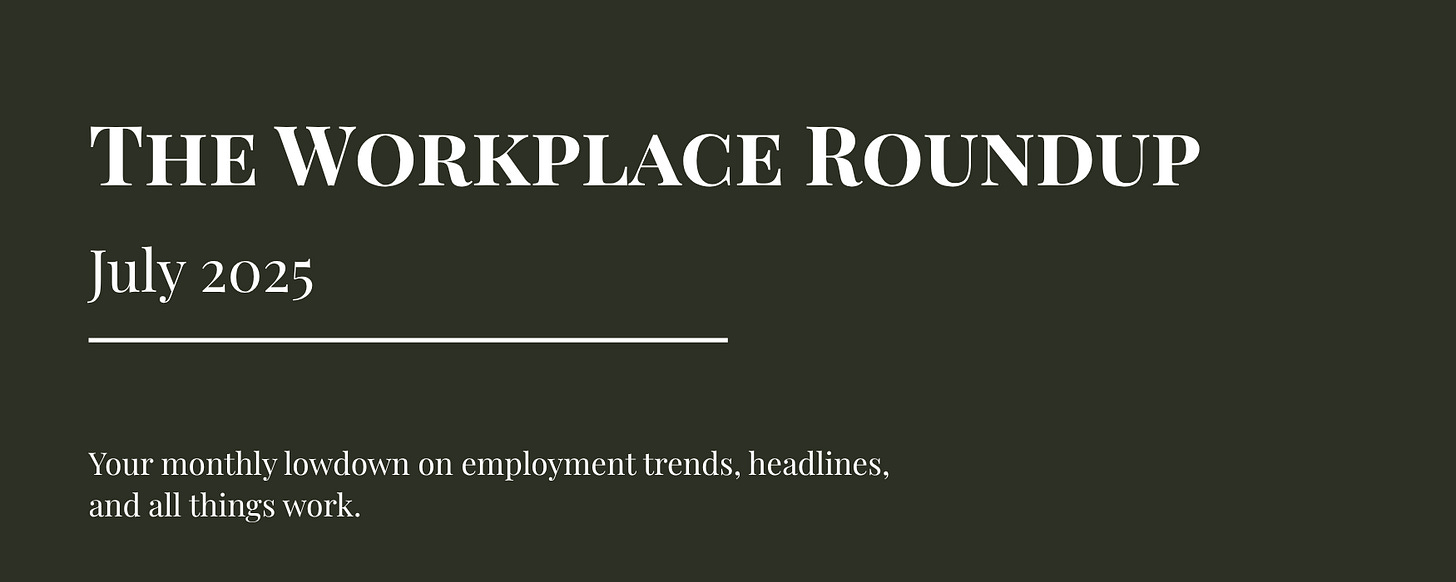The Workplace Roundup: July 2025
Discouraged worker numbers are up, coffee shops are making livable wages cool again, and Indeed is replacing 1,300 employees with AI.
This is the first newsletter in a new monthly series where I will be analyzing recent workforce trends, news headlines, and significant movements in the career-sphere.
US Workforce Trends 💼
The negative feedback loop of unemployment
Every month, unemployment numbers get released. Something that caught my eye this month was the number of long-term unemployed - people who have been jobless for 27 weeks or more. In June, the number of long-term unemployed people increased by 190,000, bringing the total to 1.6 million. This accounts for 23.3% of all unemployed people. For comparison, long-term only made up 20.8% in January 2024.
While the regular unemployment rate has remained consistently between 4-4.2% for over a year now, what the rise of long-term unemployed people demonstrates is the difficulty of re-entering the workforce after not being employed for a significant period. It’s a negative feedback loop where the longer it takes to find employment, the longer it will take to find employment. It’s a horrible situation.
Another figure which stood out to me was the number of “discouraged workers” (people who believe that no jobs were available for them 😢) increased by 256,000 in June, bringing the total to 637,000. These numbers are not included in unemployment numbers because they have not looked for a job within the past 4 weeks.
I hear everyday about how discouraging it is looking for work, especially for people who were established in their career. Finding work looks very different than how it was done even a few years ago, which is exactly why I started New Ropes! There are some incentives for employers to hire people who have been unemployed long-term, like the Work Opportunity Tax Credit (WOTC). Employers can receive $2,400–$9,600 per hire, depending on the employer’s group and the type of position hired for, but I think it’s evident this tax credit is not being effective and could use some reform.
Government jobs on the rise
On the bright side, in June, the total non-farm payroll (new jobs that were added, not in farming industries) increased by 147,000. The most job gains were experienced in state government, local government, and health care. Federal government continues to experience job loss (noooooooo, really?), but if you’re interested in non-federal government jobs you can check out - governmentjobs.com
The missing 1%
For June, the labor force participation (LFP) rate, which measures the population aged 16 or older either employed or seeking employment, was 62.3%. The LFP has yet to recover to its pre-pandemic level of 63.3%. 1% may not seem like much of a difference, but we’re talking about over a million people here who are no longer working or looking for work. It’s interesting to think about where that 1% went and how they’re doing - especially as some sectors continue to experience job vacancies and face ever-growing workforce shortages.
If you or someone you know has been facing difficulty job hunting, consider sharing New Ropes with them!
🔦Career Spotlight🔦
Financial Analyst
This role is expected to grow by 7.6% between 2022 and 2032. While many consulting firms have been going through layoffs, the finance sector has continued growing and hiring in 2025, specifically companies like Goldman Sachs and many banks. Hot spots for these roles are located in CA, TX, and NY.
Becoming a Financial Analyst: Most financial analyst roles will ask for a BA in Accounting, Finance, or Economics and will require strong analytical skills, familiarity with tech/AI, efficiency in financial software. It’s best to look for internships and entry level positions while still in undergrad to secure early experience to continue building on throughout your career.
Global Scope 🌍
Outsourcing in Africa
Entrepreneurs are starting to look to new continents for business-process outsourcing (BPO), and Africa is capturing much of their attention. As tech companies and the need for workers to train algorithms continues to grow, much of the work is expected to be outsourced to Africa. Kenya in particular is expected to see 19% growth in the BPO industry between 2023-2028. Other countries on the continent are quickly adopting Kenya’s model in creating generous tax breaks and incentives for tech companies to relocate operations there. This is good news for Africans, as 3/4s of young Africans report not finding adequate work, according to the Economist.
Work Wins, Woes, & Whoas
Work Wins 🏆
I got a tip from a friend that I should visit this coffee shop in Milwaukie, Oregon called Keeper Coffee. One thing that makes this place stand out, besides the immaculate vibes and amazing drinks, is a little note they have at the bottom of their menu:
No tip option on the tablet. Just good, honest coffee (prices were comparable to any other coffee shop around) and equitable wages for their employees! It’s encouraging to see service-based businesses leaning away from the tipping model and into paying their employees livable wages. I hope to see more restaurants and coffee shops following suit. Cheers!
Work Woes 📉
Due to spending cuts, amongst other problems, the US Bureau of Labor Statistics (BLS) is reducing the number of indicators they measure to capture the CPI (Consumer Price Index) and PPI (Producer Price Index). Commonly referred to as the dreaded inflation, the CPI demonstrates the changes in pricing for different commodities across the US, or, at least, it did.
The BLS uses enumerators (someone who collects data for the government, which I think sounds like a pretty neat job) to go out into communities and collect prices for things like housing, food, gasoline, insurance, and other metrics. For the PPI, they’ll measure things like the costs of raw materials and goods. The BLS has stated that their current resources can no longer support their collection efforts, leading to certain regions no longer being surveyed, such as Provo, Utah and Buffalo, New York.
BLS statistics have significant influence on important decision makers. They’re used in the Federal Reserve’s decision making regarding interest rates. Most employers determine yearly promotions and salary increases on them, often labeled as “cost of living” increases. They’re also used to calculate payouts for social security benefits.
These changes to the CPI are worrisome because it’ll make economic data a bit more unreliable and not capture the full experience of consumers in the economy. The CPI was already a shaky indicator for measuring economic health and livability. Now, with the index losing more reliability, the gap between “livable wages” and the actual cost of living where you work could widen.
And, in case you were wondering, the CPI for all urban consumers increased by .3% in June, making the year over year (YoY) CPI increase 2.9%. “Shelter” aka housing was up 3.8% YoY. Ooof.
Work Whoas 🚨
The job-search engines Indeed and Glassdoor (which apparently are owned by the same Japanese company Recruit Holdings, but will be combined into one platform now anyway - Indeed) are laying off roughly 1,300 jobs and replacing the roles with AI. The cuts are targeting the “research and development” and “people & sustainability” teams in the US. They are making these moves in an effort to simplify hiring, using AI to reduce manual work.
Ohhhhhh, the irony.
This is disappointing to hear, but also not surprising, as layoffs due to AI integration continue to increase. If the quality of the Indeed platform starts to mirror the downfall of Spotify’s, then I’m going to be real upset.
Personal Development 🌱
🎧What I’m listening to: The Mel Robbins Podcast - The Most Important Career Advice You’ll Ever Hear with Harvard Business School’s #1 Professor - Okay, typically the click-baity titles like this are off-putting to me, but I thoroughly enjoyed listening to this podcast and found the conversation around overcoming anxiety, learning to negotiate, and how to interview very insightful.
📚 What I’m reading: “Pass the Polenta” by Teresa Lust - During the summer, I don’t like to do a lot of heavy reading and prefer to keep my reading lighter and fun. In this collection of essays by former professional chef and food historian Teresa Lust, she shares history, kitchen tips, recipes, and lessons she’s learned throughout her career. I absolutely loved this book and would recommend it to any aspiring chefs or food lovers.
Reader Survey
Up Next ⤵️
In June, I launched my new video series titled “Learning the Ropes” where I explore different careers and industries with experts in the field. If you missed my first video, you can find it here, where I joined my friend Eric Taylor in his at-home studio to learn about his career as a music producer!
This month, I’ll be sharing my second episode where we’ll be learning all about the whiskey distilling business!
If you haven’t already, make sure to subscribe so you don’t miss it. You can also find all episodes on my Youtube channel.






